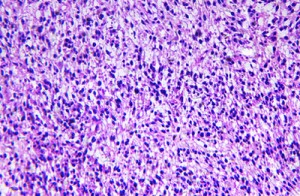New test could help personalise treatment for rhabdomyosarcoma
Posted: 15 October 2015 |
In a study, examining the activity of only five genes in a sample of the tumour was enough to identify high-risk children who might benefit from more intensive treatment…


A new gene test can identify which patients are likely to suffer more aggressive forms of the childhood cancer rhabdomyosarcoma.


In a study, examining the activity of only five genes in a sample of the tumour was enough to identify high-risk children who might benefit from more intensive treatment or from new therapies in clinical trials.
The Institute of Cancer Research (ICR) says the findings could open up the opportunity for doctors to prescribe personalised treatment for children with cancer depending on the gene activity of their tumours.
This five-gene signature, known as MG5, was developed by researchers at the ICR. It has now been validated in tests of samples from 68 patients. The test for gene activity – known scientifically as gene ‘expression’ – is the first to be able to predict accurately which children with a type of rhabdomyosarcoma called ‘fusion-negative’ will have more aggressive forms of the disease. Children with fusion-negative tumours lack a particular genetic defect often found in rhabdomyosarcoma that results in two genes, called PAX3 and FOXO1, becoming fused together.
Patients with high scores have significantly worse survival chances
Previous work at the ICR has shown that fusion-negative patients generally have a lower risk of developing aggressive disease than fusion-positive cases. But in the new study, researchers showed that the ICR’s MG5 test splits fusion-negative patients into two distinct groups, based on the activity of the five genes. Patients with high scores have significantly worse survival chances than those with low scores, suggesting the test could ultimately be included in assessment of children with rhabdomyosarcoma to decide the best treatment option.
UK study leader Professor Janet Shipley, Professor of Cancer Molecular Pathology at The Institute of Cancer Research, London, whose laboratory originally developed the test, said, “Our research showed a significant link between a particular gene signature from tumour samples and higher-risk, aggressive rhabdomyosarcoma. This study is an important step towards introducing an approach that identifies children who are unlikely to benefit from current, standard treatments and can be offered more intensive or new treatment strategies that will improve their outcome.
“We now hope to bring our test for this gene signature to the clinic as soon as possible. Our aim is to identify these high-risk cases of rhabdomyosarcoma more quickly in the clinic, and ultimately improve treatment for these children.”




